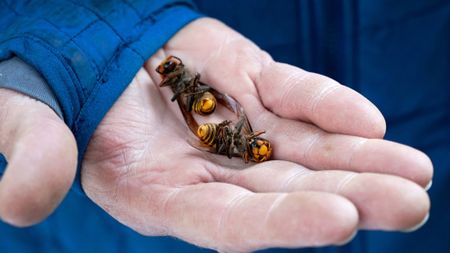Scientists can't explain almost 50 percent of the DNA found on NYC subways


A new study from Weill Cornell Medical College has revealed that New York's subway system is teeming with bacteria, many of which are unidentifiable.
Dr. Christopher Mason, lead author of the study, told The New York Times that subway riders should be impressed with the transit system's variety of life. "I want them to think of it the same way you'd look at a rain forest, and be almost in awe and wonder, effectively, that there are all these species present — and that you’ve been healthy all along," Mason told the Times.
Mason and his colleagues created a project called PathoMap, where researchers collected DNA swabs from wooden benches, subway poles, turnstiles, handrails, and doors. They found that nearly half of the DNA samples didn't match any organisms known to science, and only 0.2 percent matched the human genome.
Subscribe to The Week
Escape your echo chamber. Get the facts behind the news, plus analysis from multiple perspectives.

Sign up for The Week's Free Newsletters
From our morning news briefing to a weekly Good News Newsletter, get the best of The Week delivered directly to your inbox.
From our morning news briefing to a weekly Good News Newsletter, get the best of The Week delivered directly to your inbox.
The researchers also found three samples that were linked to bubonic plague and two samples that had fragments of anthrax DNA, though none of those samples were alive. As for the Metropolitan Transportation Authority's response to the study, a spokesperson told the Times that the study was "deeply flawed."
Sign up for Today's Best Articles in your inbox
A free daily email with the biggest news stories of the day – and the best features from TheWeek.com
Meghan DeMaria is a staff writer at TheWeek.com. She has previously worked for USA Today and Marie Claire.
-
 Following the Tea Horse Road in China
Following the Tea Horse Road in ChinaThe Week Recommends This network of roads and trails served as vital trading routes
By The Week UK Published
-
 Crossword: March 30, 2025
Crossword: March 30, 2025The Week's daily crossword
By The Week Staff Published
-
 Sudoku hard: March 30, 2025
Sudoku hard: March 30, 2025The Week's daily hard sudoku puzzle
By The Week Staff Published
-
 Dark energy may not doom the universe, data suggests
Dark energy may not doom the universe, data suggestsSpeed Read The dark energy pushing the universe apart appears to be weakening
By Peter Weber, The Week US Published
-
 Pharaoh's tomb discovered for first time in 100 years
Pharaoh's tomb discovered for first time in 100 yearsSpeed Read This is the first burial chamber of a pharaoh unearthed since Tutankhamun in 1922
By Peter Weber, The Week US Published
-
 Scientists report optimal method to boil an egg
Scientists report optimal method to boil an eggSpeed Read It takes two temperatures of water to achieve and no fancy gadgets
By Peter Weber, The Week US Published
-
 Europe records big leap in renewable energy
Europe records big leap in renewable energySpeed Read Solar power overtook coal for the first time
By Peter Weber, The Week US Published
-
 Blue Origin conducts 1st test flight of massive rocket
Blue Origin conducts 1st test flight of massive rocketSpeed Read The Jeff Bezos-founded space company conducted a mostly successful test flight of its 320-foot-tall New Glenn rocket
By Peter Weber, The Week US Published
-
 US won its war on 'murder hornets,' officials say
US won its war on 'murder hornets,' officials saySpeed Read The announcement comes five years after the hornets were first spotted in the US
By Peter Weber, The Week US Published
-
 Dark energy data suggest Einstein was right
Dark energy data suggest Einstein was rightSpeed Read Albert Einstein's 1915 theory of general relativity has been proven correct, according to data collected by the Dark Energy Spectroscopic Instrument
By Peter Weber, The Week US Published
-
 New DNA tests of Pompeii dead upend popular stories
New DNA tests of Pompeii dead upend popular storiesSpeed Read An analysis of skeletal remains reveals that some Mount Vesuvius victims have been wrongly identified
By Peter Weber, The Week US Published
